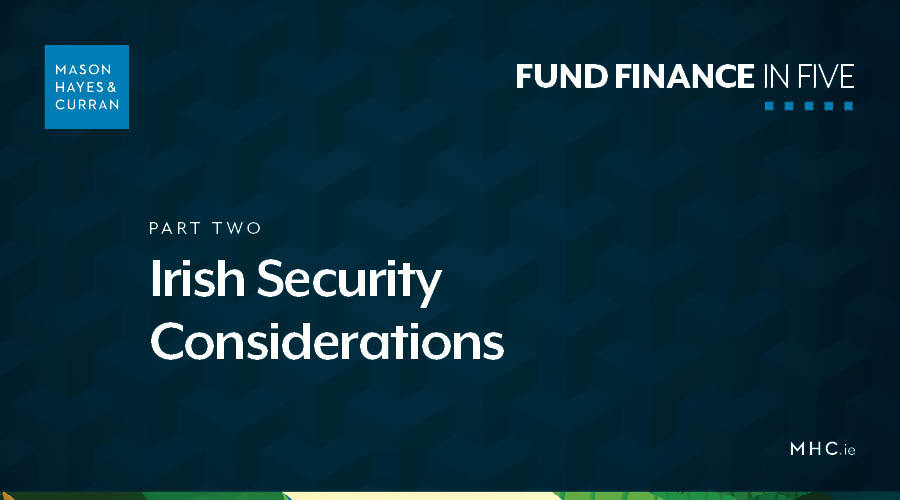Irish Fund Finance in Five Series – Part 2
Irish Security Considerations

Download full Fund Finance in Five series
Ireland is currently home to over 8,880 funds with over €4.9 trillion in net assets. More than 1,000 fund managers from over 50 different countries have assets administered in Ireland, including 17 of the top 20 global asset managers. As a destination for fund managers, Ireland offers access to the EU-wide marketing passport for UCITS and AIFs. Accordingly, Ireland is established as a domicile of choice for the global investment funds industry and the fund industry in Ireland continues to grow year on year.
In addition to the growth of the Irish investment funds industry, the global fund finance industry has experienced rapid growth over the last number of years. The fund finance industry has proven itself to be robust and withstood a number of external market factors and periods of volatility, such as:
- The current higher interest environment
- The exit of certain market participants, and
- Onerous capital requirements for financial institutions
As both the Irish investment funds industry and the global fund finance industry continue to grow, naturally the number of fund finance transactions involving Irish vehicles also continues to grow. Over time, Ireland has proven itself to be a convenient jurisdiction in which to conduct fund finance transactions. With its English-speaking population and its common law legal system, market participants based in other jurisdictions, such as the UK and the US, often find transactions involving an Irish nexus to be convenient and familiar.
We have prepared this “Irish Fund Finance in Five” series to act as a comprehensive overview of all things Irish law related in the fund finance market. This series will be split into five parts, consisting of:
- Part 1 – Common Irish Legal Issues in Fund Financings
- Part 2 – Irish Security Considerations
- Part 3 – Irish Legal Due Diligence Considerations
- Part 4 - Irish Subscription Documents Considerations
- Part 5 – Overview of Irish Fund Structures
The issues examined by us in this series act only as a summary and are not intended to be exhaustive. As readers will appreciate, this series should not be considered a substitute for legal advice and lenders and funds should engage legal counsel at the outset of a transaction to ensure that these issues are given appropriate consideration.
Download full Fund Finance in Five series
Introduction
In Part 2 of our “Irish Fund Finance in Five” series, we set out and discuss some of the specific considerations that arise in circumstances where either:
- Security is to be granted by an Irish fund, and/or
- Security is to be granted over the fund’s assets located in Ireland
In particular, we discuss the following topics:
- A “typical” security package in fund finance transactions
- Prohibition on guarantees and cascading security
- Security with an Irish nexus
- Perfection requirements and security registrations, and
- Quasi-security rights and capital call rights of third parties
1. Typical security packages
Ultimately, as with any financing, the nature and scope of the security package is a matter to be commercially agreed between the borrower and the lender(s). That being said, for certain categories of fund finance transactions, it is generally well established as to what security packages will be provided.
Subscription line facilities
For subscription line facilities, also known as capital call facilities, the generally agreed principle is that the lender(s) will have direct recourse against the uncalled capital commitments of the fund borrower’s investors. Specifically, the security package normally includes:
(i) The fund borrower’s contractual rights against its investors
In accordance with the investor subscription documents, the investors in the fund borrower are required to fund capital commitments upon request. Security will typically be granted over the fund borrower’s contractual rights to both call, and receive, the uncalled commitments of its investors.
Where the subscription documents are Irish law governed, we would expect the security to take the form of a deed of charge and assignment. It is important that a power of attorney is incorporated within the security document, allowing the lender to directly issue drawdown notices to investors in an enforcement scenario.
It is important that due diligence is carried out over the subscription documents to ensure that effective and enforceable security can be granted over the contractual call rights. We will consider this in more detail in Part 4 – ‘Irish Subscription Documents Considerations’ of our “Irish Fund Finance in Five” series.
(ii) Subscription proceeds account
Any subscription proceeds required to be funded by an investor under its subscription documents will be required to be paid into a designated account. Security over this account will typically be granted to a lender.
Where the subscription proceeds account is located in Ireland, we would expect the relevant security document to take the form of a deed of charge and assignment. The security will be bolstered by an account control agreement, which is a tri-partite agreement between the borrower, the secured party and the relevant account bank.
In accordance with the account control deed, the account may be blocked, i.e. secured party consent is required for any withdrawal, from the beginning of the security period or, as is more typically seen, only once a notice of enforcement is served on the borrower. Ultimately, the lender’s level of control over the accounts is a commercial point to be agreed at the outset of the transaction and should be reflected in the mechanics set out within the account control agreement.
NAV facilities
For NAV facilities, the established principle is that the lender(s) will have direct recourse against underlying investments of the fund borrower. Specifically, we would expect the security package to consist of the following:
(i) Bespoke security
The nature of the security granted will depend on the investment strategy of the fund borrower. For example, a security package relating to a NAV facility provided to a private credit fund may look different to that of a private equity fund. Where the fund borrower owns a diverse pool of assets, the security package may be limited to security granted over the fund’s accounts. See further details below. In some circumstances, security will also be provided over specific investments maintained within those accounts, e.g. security over the shares owned in a master fund.
Ultimately, a cost-benefit analysis will need to be conducted by the lender. The scope of the security package should take a number of factors into account, including:
- The importance of the relevant asset as part of the security package, and
- Any increased costs associated with taking specific security over the assets, e.g. the cost of obtaining legal services in another jurisdiction.
(ii) Irish security
The cash and investments owned by the fund are typically held within its cash and securities accounts. These accounts are typically maintained with the fund’s depositary. Where those accounts are located in Ireland, we would expect the corresponding security document to take the form of a deed of charge and assignment. This security would also be supported by an account control agreement, as examined in more detail above. In some circumstances, the cash and securities account is maintained with a separate account bank than the depositary. In these circumstances, separate security documents and control deeds are required. This security package is typically further supported with a charge and assignment of the fund’s rights under the depositary agreement.
Hybrid facilities
For hybrid facilities, the security package which is provided can often integrate elements of both the typical subscription line and NAV security packages that are examined above.
2. Prohibition on guarantees and cascading security
This is one of the key issues that can arise on fund finance transaction involving Irish funds. We have summarised the prohibition and the potential workaround where a “cascading security” structure is implemented in Part 1 – ‘Common Irish Legal Issues in Fund Financings’ of this “Irish Fund Finance in Five” series.
3. Security with an Irish nexus
Where there is an Irish nexus to a fund finance transaction and the security package on offer, it is prudent to take Irish law advice to ensure that the proposed transaction and security package is permitted. A transaction having an ‘Irish nexus’, can be understood as a transaction where there is an Irish entity that is party to the transaction or where there is an Irish asset being secured. Often there can be interplay with other jurisdictions that needs to be considered. For example, if a manager/trustee, which is not an Irish-incorporated entity, is to create security on behalf of an Irish unit trust, advice would need to be taken from all applicable jurisdictions. Given the nature of fund structures, these situations tend to arise more frequently on fund finance transactions than in general corporate financings.
The doctrine of lex situs is applied to determine whether it is appropriate, as a matter of Irish law, to take Irish law security over an asset. If an asset is located in Ireland, Irish law governed security should be taken over the asset in order to ensure that a valid, binding and enforceable security interest has been created over the asset.
Examples of assets which are deemed to be located in Ireland and over which Irish law security should typically be taken are:
- Bank accounts located in Ireland
- Shares or interests in an Irish company or fund, and
- Any contractual rights under an Irish law governed contract.
With accounts, the analysis as to the governing law of and the appropriate parties to the relevant security documents can become particularly complex. The following questions should be considered:
- The account holder’s name? In some instances, this can be in the name of the depositary or its nominee, rather than the fund.
- Who has signing rights to the account?
- Where is the account bank located? If the account has an IBAN, where that IBAN specifies the account is located should also be considered.
Irish law issues will need to be considered where there is any Irish entity party to a finance document. This situation can arise in a number of different circumstances, such as where the fund borrower itself is an Irish fund vehicle or where the manager/general partner is an Irish entity. It is important that due diligence is carried out on the underlying constitutional and/or fund documents of such entity. We will consider this further in Part 3 – ‘Irish Legal Due Diligence Considerations’ of this “Irish Fund Finance in Five” series.
The interplay of the laws of Ireland with those of other applicable jurisdictions will need to be considered. This may result in adjustments being made to the transaction so that it is effective in all applicable jurisdictions. For example, it is not unusual for overlapping security documents, one governed by Irish law and one governed by the law of the core finance documents, to be granted by Irish entities and/or in respect of Irish assets. While this does not cause any issues from an Irish law perspective, this can cause issues in other jurisdictions. Another example of this is that certain other civil law jurisdictions do not recognise the concept of beneficial ownership or security trusts. This requires the implementation of parallel debt provisions in syndicated transactions. It may also affect the analysis when attempting to take security over an asset in that jurisdiction, particularly where the proposed chargor does not hold legal title to the asset.
The European Communities (Financial Collateral Arrangements) Regulations 2010, as amended, is applicable in Ireland. It will apply to any Irish law security document, provided that it meets the relevant criteria.
4. Perfection requirements and security registrations
Where security is created in accordance with an Irish law security document, there are certain perfection requirements depending on the nature of the assets being secured. In a fund finance context, the most relevant assets are:
Contractual Rights: Security granted over contractual rights, such as the right to call capital commitments, are perfected under Irish law by serving notice on the contractual counterparties. Discussions are often required to determine:
- The timing for the delivery of the notice, i.e. whether to be delivered at signing or upon the occurrence of an enforcement event, and
- The method of delivery of the notice, e.g. by registered post, by email or by a portal operated by the fund’s administrator.
In the context of subscription line facilities, it should be agreed at an early stage as to how this will be achieved, i.e., will a notice sent via a portal notification service be sufficient for a lender.
Bank Accounts: Security granted over contractual rights are perfected under Irish law by giving notice to the applicable account bank. However, as discussed, it is customary for any security over accounts to be bolstered by control arrangements, which will incorporate this notice to the account bank.
Where security is granted by or on behalf of an Irish entity, or a non-Irish entity with a branch in Ireland, security registrations will likely need to be made in Ireland. These registrations must be completed within the specified timeframe to preserve the enforceability and priority of the security. This applies regardless of whether the security document itself is governed by Irish law.
For example:
- ICAVs: Any security created by an ICAV or its sub-funds will need to be registered with the Central Bank of Ireland by filing a Form CH.1 within 21 days of the creation of the security.
- Investment Companies / PLCs / Irish Companies: Any security created by the company / fund, including its sub-funds, will need to be registered with the Companies Registration Office of Ireland (the CRO) by filing a Form C1 within 21 days of the creation of the security.
- Unit Trusts / CCFS / Limited Partnerships / ILPs: These entities do not have separate legal personality. Therefore, the applicable security registrations to be made on behalf of these entities will depend on the appropriate person that is creating security on behalf of the fund. This is usually either or both of the manager and the trustee/depositary, or the partnership usually through the general partner. To the extent the relevant entity is an Irish incorporated company, any security granted by it on behalf of the fund should be registered at the CRO by filing a Form C1 within 21 days of the creation of the security. If the relevant entity is not an Irish-incorporated company but has established a branch in Ireland, any security it grants on behalf of the fund over assets located in Ireland should be registered with the Companies Registration Office (CRO). This requires filing a Form F8 within 21 days of the security's creation.
Where an Irish company creates a fixed charge over book debts, a notification of this charge should be made to the Irish Revenue Commissioners within 21 days of the creation of the charge.
5. Quasi-security rights and capital call rights of third parties
Third party service providers will often be appointed by a fund to carry out certain functions on its behalf. For example, a trustee may be appointed to hold assets on behalf of the fund. The documents which these third-party service providers are appointed under can sometimes grant these parties quasi-security rights over the fund’s assets. By way of example, a trustee or account bank holding assets on behalf of a fund may be granted rights of set-off or a lien over the fund’s assets regarding any fees or other liabilities owed to them by the fund. Where these rights have been granted, they can compete with the lender’s security package. As such, these documents should be reviewed by lender’s counsel prior to drafting the security documents.
To work around these rights, lender’s counsel may look to put side letters in place with the relevant third-party service provider. These side letters will typically subordinate the rights of the third-party service provider to the lender’s rights. As a result, the quasi-security rights of the third-party service provider will be prevented from ranking in priority to the lender’s security interest.
A fund, acting through its directors, general partner or manager, will typically be the party entitled to make capital calls from its pool of investors. However, the right to make these capital calls may be delegated to a third-party service provider acting on the fund’s behalf. For subscription line facilities, the relevant security documents will typically look to assign this right to make capital calls to the lender. Therefore, any third party to whom this right has been delegated should also be a party to the security document that assigns this right to the lender.
Comment
At the outset of a transaction, no parties intend on the loan facility defaulting. However, having effective and well drafted security will ensure priority of a secured party’s claims and facilitate an expedient recovery process, which the secured party has control over. Given the nature of security documents, their effectiveness will only be tested in a “worst case scenario”. Accordingly, it is critical that sufficient attention is dedicated to the security arrangements at the documentation stage.
For more information and expert advice, please reach out to a member of our Fund Finance team. Stay tuned for the remaining issues of our ‘Fund Finance in Five’ series.
The content of this article is provided for information purposes only and does not constitute legal or other advice.
Share this:



